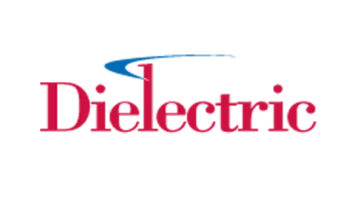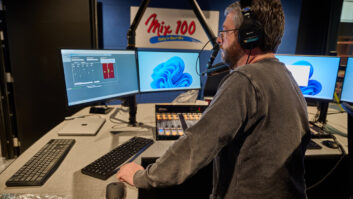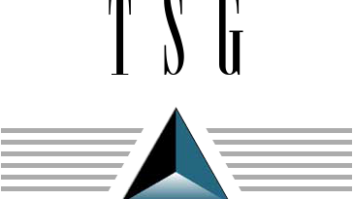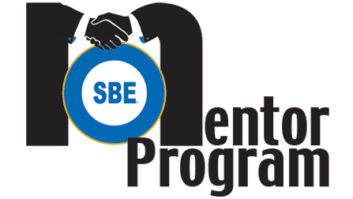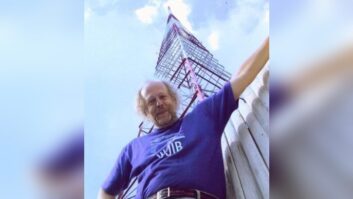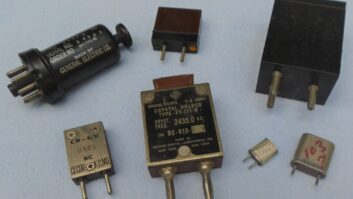Tom King has led Kintronic Labs since 1983 and is considered one of the industry’s leading experts on AM radio transmission technology. After news came this winter that his son Joshua had been named president/CEO, we decided to check in with Tom about what comes next. That interview is below.
In 1949 Tom’s father Louis King left the Radio Corporation of America to pursue his own business in RF. Kintronic subsequently was formed in 1962 and has become one of the industry’s most respected technology suppliers. It is based in Bristol, Tenn. Louis received the Radio Engineering Achievement Award from the National Association of Broadcasters in 2007, and Tom received the same award eight years later.
Third-generation Joshua began work with the company in 2018 as a project engineer. Earlier he was a project engineer for systems integrator Affinity Energy.
According to a bio on the KTL website, “Joshua is excited to be involved in RF engineering and looks forward to building on Kintronic Lab’s foundation of excellence in medium-wave antenna systems and expanding the company’s expertise in the VLF, LF, HF and ISM bands, while continuing to maintain a reputation of high-quality work and great customer service.”
Radio World: What change will this mean in your business and how customers might interact with you?
Tom King: Joshua has taken the role of administrative leadership on a day-to-day basis. I’ve been sharing various responsibilities with him for three years toward that end.
Josh is a people person. He is working closely with our engineering staff and manufacturing personnel to streamline our operations and to enable us to be more responsive to customers on a broader basis.
My role is to be supportive of them in projects and working with customers; that can still involve being involved in travel. But Josh will be the primary go-to guy for anything from design engineering proposal work to HR.
My wife and I are loving the role of grandparenting and are doing a lot more of that.
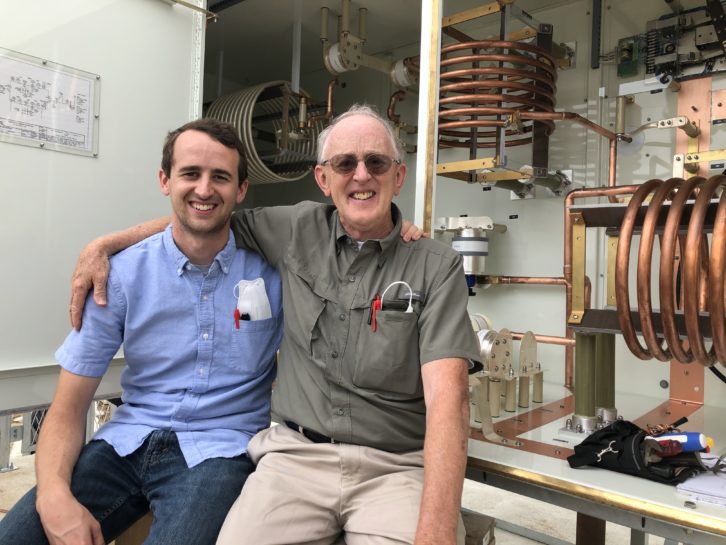
RW: I’m sure your father would be proud. But you work in an area that often is described as challenging, at least the AM radio side of it.
King: We have been diversifying more, realizing the nature of the AM broadcast business worldwide. But we’re still actively involved. Thankfully we have not been impacted significantly by COVID, so we have been able to maintain our manpower. We’ve been doing more international business, which has been a mainstay. We are seeing more business here in the U.S. too, a lot of it is in the sale of transmitter sites — stations being moved to multiplex on other sites in the same market.
We’re providing equipment to put telecom services on AM towers; we’re building AM and FM dummy loads. We’re doing more government and defense work.
RW: How many employees do you have these days?
King: Around 32 employees right now. We had up to 55 at one time. We’ve been hiring more people.
RW: What kind of work has Josh been doing?
King: It’s interesting. He started in January of 2018. Five years earlier, when he was an intern at Trans World Radio Bonaire, they were just starting to talk about upgrading their station to its original power. [The Caribbean broadcaster decided to rebuild to boost from 100 kW to 440 kW. It is heard on 800 kHz with “the largest AM transmitter in the Western Hemisphere.” At radioworld.com, search “Bonaire makeover” to read our 2018 profile.]
Josh was involved in all the planning and designing of the tuning-house buildings and planning the site for the power upgrade.
Then lo and behold, he comes [to Kintronic] in January 2018 — and his first responsibility was to go with me to Bonaire, to commission the patterns of the station! That was his first foray working with me in the field.
Josh has been working on as a principal investigator on various government projects, working in product development, helping streamline our manufacturing process here. In March we also launched a new e-commerce site.
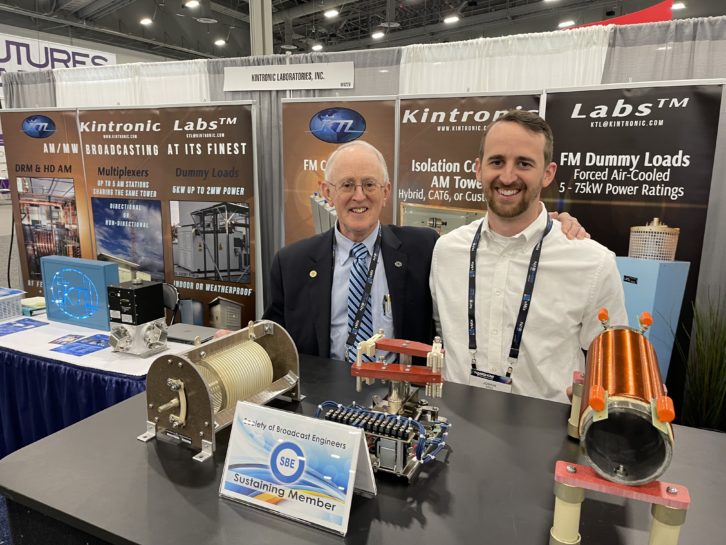
RW: I would think most of what you sell wouldn’t lend itself to e-commerce.
King: There are products that people want fast. They want to be able to place orders by their cellphone or online, any time of day or night.
Broadcast is 365 days a year, 24 hours a day. When people are off the air, they’re off the air. We’re trying to be in a position to respond whenever we can, wherever we can.
As Josh put it, we’ve tried to take some of the complexity out of the ordering process. We tried to take a “McMaster-Carr-like approach,” as everyone knows that site is easy to navigate. We’ll continue to add items to the site throughout the year.
RW: Many conversations I’ve had with engineers about AM radio have been, frankly, depressing. Do you have words of encouragement for broadcasters who know and respect your opinions about AM?
King: This is what I tell AM broadcasters: Number one, it needs to be live. Number two, it needs to be local. Number three, it needs to be relevant.
If they can adhere to those three things, they’re going to be successful.
We work with broadcasters from small to large, in any size market, who are successful because they’re meeting needs. We talk about Pandora’s and all these other services, but people want to know where the deals are. They want to know where they can buy a car. Advertisers are still seeing the benefits of radio, with people listening to radio in their cars.
I know there’s the battlefield of the dash now. Frankly I think the dash is getting too complicated for people to drive and be able to function safely. It really concerns me. It’s still got to be simple, guys! People don’t want to get in their car and spend 10 minutes trying to figure out what to do.
I’m thankful to be involved with the National Radio Systems Committee and AM Improvement Working Group. Those are dedicated folks who really care about AM radio and are looking at it from the standpoint of improvement in receivers, reducing the ambient noise and making the fidelity and quality of AM, even in analog, still competitive with FM.
We’re certainly in favor of new technologies like HD Radio all-digital AM and DRM. We’ve worked worldwide with these digital services. It all comes down to receiver penetration in the market.
RW: Are you surprised about what’s been going on with shortwave? It seems to me shortwave has been more resilient than had been predicted 10 or 20 years ago.
King: In certain parts of the world shortwave is still widely listened to medium. China is a large shortwave user; they’re the largest shortwave DRM broadcaster in the world. India has shortwaves in DRM and analog, and there are shortwaves in Africa.
VOA has largely gone to internet delivery versus terrestrial, which I think is a big mistake in terms of reaching the most people, but obviously it has great attraction from the standpoint of low cost.
AM on shortwave, from the standpoint of distance and mass audience coverage, is still a very effective medium. Atmospheric properties lend itself to those services, and folks like Trans World Radio and Far East Broadcasting want to reach their audiences from a distance because the countries are closed to inside broadcasting.
RW: Have you had supply chain issues?
King: Yes, with some components — for instance resistors and some accessories that we use in dummy loads. We had some items that we ordered last summer that we took delivery on in January. Thankfully we’re still able to get our metal raw materials.
A new engineer we hired last year has helped us reduce our costs in manufacture of RF components, and we’ve incorporated new equipment that is going to allow us to reduce our production time substantially.
RW: What else should we know?
King: Our company is dedicated to providing the best service and the best products over the price range. For people who need something in a hurry, if somebody’s off the air, we have surplus components in stock to make equipment available in a hurry. We’re striving toward better delivery and turnaround and having more items in stock. We’re here for the industry and we’re not going anywhere.
About Joshua King:
The grandson of Kintronic founder Louis Arthur King, Joshua earned his BSEE at Clemson University in 2015. After graduating he joined systems integrator Affinity Energy, in Charlotte, N.C., where his work involved utility scale solar monitoring and controls design, installation, programming and testing. He joined the engineering staff at Kintronic Labs as a project engineer in 2018 and has been involved in aspects of operations from human resources to field installation and commissioning. In January 2021, he passed the Professional Engineering Electrical and Computer: Power exam and obtained his Professional Engineering License. In January 2022 he assumed the role of president and CEO.





